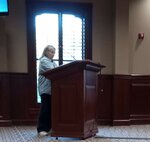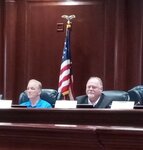

On Tuesday, August 21, the City of Granbury voted to approve a new sublease agreement with the Hood County Genealogical and Historical Society. This decision could impact how the historic railroad depot is used in the future.
The motion grants the city manager the authority to finalize and execute the agreement once approved. The City Council gathered to deliberate the details of the deal, which also involves the Ft. Worth and Western Railroad.
“It’s been a long wait to get to this point,” City Manager Chris Coffman remarked, acknowledging the patience of the meeting attendees, who had been sitting and waiting for three and a half hours.
CONCERNS ABOUT PARKING AND LEASE CLARITY
Parking issues at the Railroad Depot had been a point of contention for some time. Community members had raised calls and concerns about being ‘parked out’ of the lot, and the council recognized the need to address these with a new lease agreement.
Michael Ross, Deputy City Manager, was then called upon to explain the current status of the negotiations and the importance of finalizing the lease agreement.
However, before diving into those details, Coffman surprised everyone by pointing out a crucial aspect of the existing lease that could potentially alter the entire conversation.
“There has been maybe a misunderstanding of what the sub-lease actually says for years,” City Attorney Jerremy Sorelle said. He explained that the city leases the entire property from the railroad, including the parking area designated for civic use, not private. “What we sub-lease to the entity (the society) is only the building,” he clarified.
Sorelle pointed out that the sub-lease specifically limits (society) usage to the buildings and not the parking lot, which has been governed by zoning laws since its execution in 1983.
“The lot is in the central business district, and zoning laws tell us that it is open parking,” he said. He emphasized that the city could not privatize the parking area or impose restrictions like towing due to these zoning regulations. Sorelle concluded that the city had proposed a new lease to align with current laws and resolve any confusion.
“It makes perfect sense the way you’re saying to me,” Coffman responded, adding, “And I’m sorry that it took this long for us to figure that out.”
NEW LEASE TERMS AND NEXT STEPS
The new sub-lease agreement proposed several changes to the original terms, including requiring the property to be used exclusively as a museum and to preserve historical documents and artifacts.
The sub-lease term would be limited to 10 years rather than in perpetuity as had been the case, with a 90-day notice period for termination by either party, an increase of 60 days over the old contract.
Additionally, the city agreed to contribute $2,500 annually to help the society cover utility costs associated with the depot’s operations. However, the contentious parking issue would need to be removed from the agreement to avoid legal complications.
As the council moved forward, it became clear that they were committed to resolving these issues and ensuring the historical site could continue to serve the community within the bounds of the law.
“Let’s move forward and put together a new lease,” Mayor Jim Jarratt concluded, signaling a willingness to proceed with the revised agreement.
IMPORTANCE OF THE SOCIETY
The meeting continued with rising tensions over parking issues related to the proposed sub-lease agreement between the City of Granbury and the Genealogical and Historical Society.
There were concerns about how parking arrangements affected tourism and local businesses, which brought the discussion back to this challenging topic.
Historian and society volunteer Karen Nace expressed frustration, saying, “We never saw a penny of that promised $200 donation for an event.”
Though the society had faced parking challenges, especially during events, it chose not to enforce parking restrictions strictly to avoid deterring visitors. Nace explained, “We thought that was not a message we wanted to send. People could have come out and found their cars gone if we had called tow trucks.”
As the discussion continued, the impact of special events on the society’s parking lot became a key point. City officials questioned whether the city had permitted a classic car event on the society’s lot.
Michael Ross, Deputy City Manager, clarified that the automobile event had been held across the street, and the society’s parking lot had been used for convenience. “Everybody just used their parking space,” Ross said, explaining that while this was a cooperative gesture, it led to complications.
Mayor Pro Tem Steven Vale had recently visited the train depot and acknowledged the society’s important role in preserving local history. “What they provide to the city and its character is very important.”
Vale suggested putting up signs in the parking lot to reserve some spaces for the train depot, though enforcement would only be a courtesy request — to require it would be unlawful.
“We can’t enforce it,” Vale continued, “but it might give somebody cause to say, well, we really shouldn’t park in that spot. It may just be an opportunity to provide a courtesy out to the people that are going to use that parking lot to not park in those spaces.”
A key point of discussion was the impact of the new lease on the society’s operations, particularly regarding its meeting schedules. The society was concerned that the lease might restrict its ability to hold meetings on Thursdays, which it has been doing for 40 years.
The city assured them that the goal was to work out an agreement that would allow the society to continue its operations while adhering to the legal requirements of the lease.
During the meeting, Jarrett initially requested a motion to approve the agreement. When no motion was made, some discussion ensued, suggesting that the city did not want the Hood County Genealogical and Historical Society to remain.
However, the mayor clarified that the city did, in fact, want the society to stay and stressed the need to follow the law and ensure that the new agreement worked for everyone.
Subsequently, council member Bruce Wadley motioned for the City Manager to finalize and execute the agreement with the society and the Fort Worth and Western Railroad.
The council voted on the motion, with all members in favor, as indicated by a unanimous “aye.”
Jarratt then asked if any additional parties or discussions were needed, indicating that more steps might be required to complete the process.
The society was advised to coordinate with the railroad, Coffman, and other relevant parties to finalize the agreement’s details.